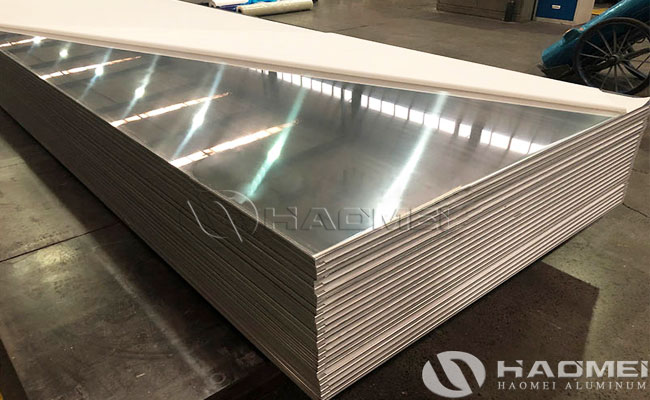5052 h38 aluminum sheet, as a high-performance type of aluminum-magnesium alloy, occupies an important position in industrial production and high-end manufacturing fields due to its balanced mechanical properties, excellent corrosion resistance and good processability.
Alloy composition of 5052 h38 aluminum sheet:
5052 h38 aluminum sheet belongs to a typical Al-Mg (aluminum-magnesium) alloy system. The composition ratio strictly follows international and domestic standards, as follows:
– Main alloying elements:
Magnesium (Mg) content 2.2%-2.8%, the core element determining its strength and corrosion resistance. It enhances the matrix strength through solid solution strengthening and imparts excellent corrosion resistance to the alloy.
– Auxiliary alloying elements:
Chromium (Cr) content 0.15%-0.35%, which refines the grain structure, inhibits recrystallization, and further optimizes corrosion resistance and mechanical property stability.
– Impurity control:
Silicon (Si) ≤0.25%, Iron (Fe) ≤0.4%, Copper (Cu) ≤0.1%, Manganese (Mn) ≤0.1%. Strict control of impurity content is maintained to avoid affecting processing performance and corrosion resistance.
– Matrix elements:
Aluminum (Al) is the balance, ensuring the alloy’s basic plasticity and processing adaptability.
Specifications of 5052 h38 aluminum sheet:
– Thickness: Standard supply range 0.2mm-200mm, special customization available up to 0.15mm (ultra-thin) and 600mm (thick), with 0.5mm-10mm thin sheets being the most widely used;
– Width: Standard width 30mm-3100mm, common specifications 500mm, 1000mm, 1220mm, 1500mm, 2000mm, ultra-wide sheets can be customized according to production equipment capabilities;
– Length: Customization supported, standard length 500mm-13000mm, coil lengths up to tens of meters, meeting batch continuous processing needs;
– Supply forms: Sheets (flat sheets, patterned sheets), coils (strips), customized cut parts, some manufacturers can provide pre-bent, pre-stamped semi-finished products.
Standards and equivalent grades of 5052 aluminum sheet:
– Chinese standards:
GB/T 3880 (General Aluminum Alloy Sheet and Strip Standard), YS/T 711-2020 (Dimensional Tolerance Standard for Aluminum and Aluminum Alloy Sheet and Strip);
– International standards:
ASTM B209 (American Standard), EN 485 (European Standard), JIS A5052 (Japanese Standard);
– Equivalent grades:
American 5052, European EN AW-5052, Japanese JIS A5052, Chinese GB 5052. These grades share consistent core properties, differing only slightly in dimensional tolerances and surface quality requirements, and are interchangeable.
Characteristics of 5052 h38 aluminum sheet:
– High strength and fatigue resistance:
Tensile strength reaches 170-305 MPa, conditional yield strength ≥65 MPa, exhibiting outstanding strength among non-heat-treated aluminum alloys, particularly suitable for applications subject to dynamic loads.
– Excellent corrosion resistance:
Superior resistance to marine atmospheric corrosion compared to 3-series and 6-series aluminum alloys; no pitting corrosion after 240 hours of salt spray testing; corrosion rate at welded areas is 50% lower than the base material; suitable for high humidity or salt spray environments.
– Good machinability:
Plasticity: H38 temper (1/4 hard) balances strength and formability; bending radius up to 1.2 times the plate thickness, suitable for complex shape machining.
Weldability: Argon arc welding yields 90%-95% strength retention; airtightness requires specific solder improvement; suitable for manufacturing structural components requiring welding.
Lightweight and surface treatment: Density 2.68 g/cm³, only 1/3 that of stainless steel; anodized film thickness 10-25 μm; salt spray corrosion resistance increased to 500 hours; fluorocarbon coating provides up to 20 years of weather resistance.
Typical applications of 5052 h38 aluminum sheet:
– Aerospace:
Manufacturing aircraft fuel tanks and fuel lines (1-4 mm thick), utilizing its lightweight and corrosion resistance to reduce flight load and extend service life.
– Shipbuilding and marine engineering:
Hull sheet metal parts and ship structural components, certified by classification societies (such as CCS), meeting stringent marine environmental requirements for seawater corrosion resistance.
– Automotive industry:
Body panels and chassis structural components, replacing some stainless steel parts (such as SUS304*0.3mm), achieving weight reduction of over 30% while maintaining strength.
– Electronics and electrical appliances:
Mobile phone mid-plates and heat sink base plates, utilizing its high thermal conductivity (9 times that of stainless steel) and non-magnetic properties (not affecting GPS functionality), adapting to the trend of thinner and lighter designs.
– Industrial equipment:
Pressure vessels, refrigeration units, and instrument housings, balancing strength and corrosion resistance requirements.
In summary, 5052 H38 aluminum sheet, with its comprehensive advantages of “high strength + high corrosion resistance + easy processing,” has become a versatile aluminum alloy material across industries. Its applications cover multiple fields from consumer goods to industrial manufacturing. Proper selection and standardized processing can fully realize its performance value.

